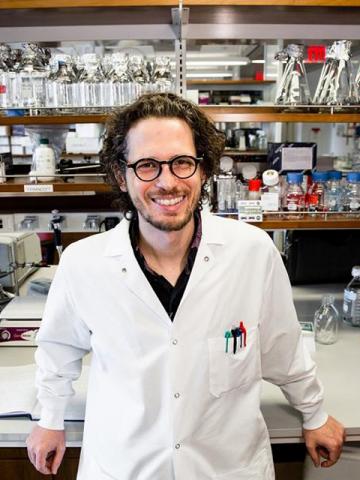All of our exceptional MTOR preceptors conduct leading-edge cancer research with a strong translational focus. The research interests of the MTOR faculty are diverse but inter-related, as attested by numerous collaborations and common publications.
The synergies between basic researchers and physicians are one of the major strengths of this program, providing true hands-on training in translational research.

The Blenis Laboratory investigates how cells sense and integrate cues to maintain cellular homeostasis. Particularly, we are interested in understanding how these mechanisms are hijacked by cancer cells to promote tumorigenesis and drug resistance. Utilizing state of the art technologies, we observe and manipulate these pathways in a variety of cell-based and mouse models of cancer. The Blenis Laboratory is a part of the Meyer Cancer Center at Weill Cornell Medicine, a newly established cancer center in the heart of NYC where Dr. Blenis is Associate Director of Basic Science. Dr. Blenis is also the Department of Pharmacology Graduate Program Director at Weill Cornell Medicine and is affiliated with the Tri-Institutional training programs (centered among three premier New York Institutions: Weill Cornell Medicine, Memorial Sloan Kettering Cancer Center and the Rockefeller University. | Blenis Lab

My lab studies the biology, biochemistry and chemical biology of the microtubule cytoskeleton and the molecular mechanisms of action and resistance to microtubule inhibitors (MTIs) both the ones clinically approved for use in cancer chemotherapy and several others in development. At the cellular level, my research is focused on the identification of microtubule-dependent cell signaling and trafficking pathways that are critically involved in cancer initiation and disease progression. We use functional cellular and molecular biology assays coupled with high-resolution microscopy and live-cell imaging to gain new information on the spatial and temporal regulation of microtubule-cytoskeleton dynamics and its effects on cancer-cell survival.

Using somatic cell reprogramming and embryonic stem cell as a study systems, the Apostolou group focuses on dissecting epigenetic mechanisms that regulate gene expression and cell fate in the context of normal development or tumorigenesis. We have recently demonstrated that selected retention of transcription factors and chromatin marks on the mitotic chromatin is important for propagation of stem cell identity after cell division (Liu et al, Cell Reports 2017). We have also shown that transcription factors, such as KLF4, play important roles in the organization and transcriptional regulation of 3D enhancer hubs during reprogramming (Di Giammartino et al, Nature Cell Biology 2019). To address these questions, we routinely utilize and continuously improving genome-wide chromatin assays, including ChIP-seq, ATAC-seq, 4C-seq, HiChIP and HiC as well as tools for genetic and epigenetic engineering for functional interrogations. | Apostolou Lab

The Barbieri lab at Weill Cornell investigates the molecular underpinnings of prostate cancer and other urologic disease. We use cutting edge genomic and transcriptomic analysis to identify novel alterations in human cancers. We study these using genetically engineered mouse models and next-generation in vitro models such as organotypic culture systems. Our long-term goal is the definition of distinct molecular classes of prostate cancer, functional modeling of these subtypes to define drivers, signaling pathways, and therapeutic vulnerability, and translation of this information to the care of prostate cancer patients. | Barbieri Lab

My laboratory works on cancer research that focuses on the mutant p53 gain-of-function pathway and the MDM2 and MDMX pathways. Signal transduction pathways converging on the tumor suppressor p53 are central in the regulation of cell growth and cell death. Conventional chemotherapeutics result in wild-type p53 checkpoint activation. However, in many cancers the normal wild-type p53 pathway is not functioning. Moreover, many cancers have mutated p53 genes that express stable gain-of-function mutant p53 (mtp53) proteins. When the p53 pathway is blocked, or mutated, a more targeted chemotherapeutic approach is required to result in cancer cell death. As such, a focus on targeted cancer cell killing approaches are central to the research being carried out in the Bargonetti laboratory. The work focuses on mtp53, MDM2, and MDMX molecular signal transduction pathways and targeting these pathways for improved cancer detection and treatment. | Bargonetti Lab

The lab is interested in understanding why obesity leads to an increased risk of cancers, including postmenopausal breast cancer. We have been particularly interested in the role of dysregulated metabolism in the breast microenvironment and how it leads to an increase in estrogen production, a key driver of obesity-related breast cancer. | Brown Lab

Lymphomas are genetically diverse and complex ecosystems that evolve in response to selection pressure from the environment. By employing an array of molecular and cell biology techniques, we study how microenvironmental, metabolic and epigenetic heterogeneity interact and evolve with genetic of cancer cells and how this influences cancer progression and therapy success or failure. | Cerchietti Lab

My research interests fall broadly under the umbrella of cancer epigenetics. Using pancreatic and liver cancer as model systems, my laboratory aims to:
Our ongoing projects span the breadth of metabolism, signaling, and development to understand the chromatin-based mechanisms of complex cell fate decisions that define these lethal malignancies. | Chandwani Lab

The Dow lab investigates the initiation, progression, and response of colorectal cancer using in vivo animal model systems and ex vivo organotypic cultures. | Dow Lab

I direct the Englander Institute for Precision Medicine, an Institute that focuses on using genomics and informatics to make medicine more individualized. I am also Associate Program Director of the Clinical and Translational Science Center and Associate Director of the Institute for Computational Biomedicine. The focus of my research group is on the systems biology of cancer; we focus on prostate cancer and hematological malignancies. In these cancers, we are elucidating the patterns of aberrant pathway activities, rewiring of regulatory networks and cancer mutations that have occurred in cancer cells. We are also trying to understand how tumors evolve at the genomic and epigenomic level. We use high-throughput sequencing (ChIP-seq, RNA-seq, bisulfite conversion followed by sequencing — specifically RRBS-, ATAC-seq, exome capture and sequencing, single cell RNAseq using DropSeq) to decipher epigenetic mechanisms and regulatory networks at play in malignant cells and study how they affect gene expression. We use drug repositioning to identify small molecules that can target mutated signaling pathways and classically undruggable proteins such as transcription factors. We model complex signaling pathways to identify drug combinations that can most efficiently shutdown aberrantly active pathways in cancer. | Elemento Lab

The Faltas Lab focuses on studying bladder cancer as a model disease for dissecting the fundamental biological mechanisms that drive the evolution of human cancers. We are investigating the role of the APOBEC3 mutagenic enzymes which edit the genome of cancer cells. We use a broad range of experimental tools and models to understand their role in cancer evolution. Our work aims to improve the lives of bladder cancer patients by translating our discoveries to early-phase and first-in-human clinical trials. | Faltas Lab

My lab utilizes translational approaches to understand vulnerabilities and tailor therapeutic strategies in leukemia and multiple myeloma. The research program is focused on approaches for targeting malignant stem cells without harming their normal counterparts. Such approaches include novel small molecule inhibitors, nanoparticles and chimeric antigen receptor T cells.
Understanding impact of measurable residual disease (MRD) in disease progression, the role of leukemia stem cells in MRD. Assess clonal hematopoiesis to understand its role in malignant transformation.
Implement 3D co-culture systems to mimic the bone marrow microenvironment to assess drug response in leukemia, myelodysplastic syndrome and multiple myeloma. | Guzman Lab

We are committed to discovering fundamental principles in evolutionary biology and biological regulation of mammalian cells. We study primarily human cancer which constitutes a unique phenomenon in evolutionary biology — ‘reverse engineering’ whereby cells rescind the multicellular contract, and evolve to more closely resemble unicellular organisms.
Importantly, the evolutionary plasticity of cancer imposes significant limitations on the potential of cancer therapies. Our goal is to chart a roadmap of the basic dimensions that determine the course of cancer evolution, in order to devise therapies that directly anticipate and address tumor evolution. | Landau Lab

Dr. Massimo Loda is the David D. Thompson Professor and Chair of Pathology and Laboratory Medicine at Weill Cornell Medicine; and Pathologist-in-Chief in the New York-Presbyterian-Weill Cornell Campus. He has worked as a physician-scientist, performing clinical work as a genito-urinary pathologist as well as a molecular pathologist. For years, his laboratory has focused on metabolic alterations in prostate tumorigenesis, with specific interest in lipid metabolism and its regulation. This has lead to the identification of potential vulnerabilities in the metabolic reprogramming of lipid synthesis that occurs in tumors in general and in prostate cancer in particular. Clinical trials with inhibitors of the rate limiting Fatty Acid Synthase enzyme are currently underway. His approach is multidisciplinary, utilizing cell lines, orthotopic tumor xenograft, genetically engineered murine models, and human tumors. He has also been at the forefront in the invention and application of novel molecular pathology techniques such as ex vivo organotypic cultures, multiplexed immunohistochemistry and in situ hybridization, advances in image analysis and applying molecular techniques such as metabolic profiling to formalin-fixed, paraffin-embedded tissue.
The Melnick Lab's research is focused on hacking the immune system’s software control systems to understand lymphomagenesis and create curative immunotherapies. Major areas of research include:
How somatic mutations in chromatin modifying proteins induce malignant transformation of the immune system.
We use highly complex genetically engineered mice, cutting edge epigenomic and single cell analysis systems, as well as advanced imaging methods to define with unprecedented depth the biochemical and biological mechanisms through which lymphoma founder mutations reprogram the immune system to support malignant transformation of B-cells. This research involves close collaboration with tissue organoid engineers, microscopy physicists, computational biologists, immunopathologists, and many others, for a truly multidisciplinary and impactful approach towards understanding these immune neoplasms.
How to create targeted epigenetic therapies that eliminate lymphomas by restoring anti-tumor immunity and enhance the activity of immunotherapy agents.
We aim to create and translate true precision epigenetic therapy regimens that will provide definitive solutions for reprogramming the immune the system to reject and eradicate lymphomas. We are especially focused on the rational use of these compounds to enhance the activity of immunotherapy agents such as checkpoint inhibitors, CAR-T cells, etc. Current immunotherapy research largely ignores how specific tumor mutations determine resistance to such treatments, and how those mutations can be targeted to maximize response. Along these lines we aim to create precision epigenetic/immunotherapy pairings that take all of these factors into account so as to create truly curative regimens. Critical to the success of such efforts is our integrated use of syngeneic lymphoma systems such as genetically engineered mice, as well as humanized mice bearing human lymphomas, and clinical trials in canine lymphoma patients. We are currently partnering with Pharma or developing in our own compounds towards this end.
Understanding the epigenetic basis of acute myeloid leukemias and development of combinatorial epigenetic therapies that can eradicate leukemia repopulating cells.
Research from our group established that deregulation of epigenetic mechanisms is the biological hallmark of acute myeloid leukemia (AML). We performed the first genome wide epigenetic profiling studies of these tumors, identified many novel epigenetic disease driving mechanisms such as the example of how IDH mutations and TET2 mutations reprogram the epigenome. We discovered epigenetic allele diversity as a critical mechanism driving development and relapse of AML (as well as lymphomas), and have demonstrated how somatic mutations in epigenetic modifiers such as TET2 result in unexpected reprogramming of the 3D architecture and chromatin landscape of leukemia cells. Current projects in the lab are studying how particular genetic mutations in AML (e.g. NPM1, DNMT3A, TET2, etc.) result in synthetic lethality and vulnerability to particular combinations of epigenetic targeted therapies. | Melnick Lab

The overarching theme is to understand cancer cell intrinsic and extrinsic programs that contribute to tumor growth and metastasis in breast and lung cancer. Cancer cell intrinsic programs include aberrant signaling pathways, which we investigate at several levels including transcriptional regulation, epigenetic regulation, and regulation by small regulatory RNAs. Cancer cell extrinsic programs include the contribution of the tumor microenvironment (TME); particularly dissecting the complexity of various stromal cell types to unravel tumor-stroma crosstalk that regulates key cancer hallmarks including angiogenesis, immunity, inflammation, epithelial to mesenchymal transition, therapeutic resistance, metastasis dormancy, initiation and progression. | Mittal Lab

Prostate Cancer Metastases
Nowak lab investigates genomic and cellular events causing prostate cancer metastases. Prostate cancer is one of the most prevalent cancers among men, causing nearly 30,000 deaths in the United States each year. Metastases are the main cause of death, with the 5-year survival rate of metastatic PC at only 28%. In contrast, the 5-year survival rate of organ confined disease is almost 100%.
Major Goals
The main goal of the Nowak lab is to define novel molecular targets that can prevent metastases and/or cure existing metastases. It is the hope that such targets will lead to therapeutic intervention, that is critical to strengthening the efficacy of patient care.
Technologies
The Nowak lab employs a wide range of technologies in its investigation of cancer metastasis, from genetically engineered mouse model systems and organoids to single-cell genomics, transcriptomics, metabolomics and signaling pathway analyses. | Nowak Lab

The main cause of death in cancer patients is the spread of cancer cells from the original tumor site to vital organs in the body. This process is called metastasis. Yet there are no therapies that specifically target metastatic cancer cells. Current chemotherapies target the original tumor but also poison normal cells in the body, limiting the efficacy of treatment and leading to toxic side effects. In order to bring effective and specific therapies against metastatic disease to the clinic, it is imperative for us to identify specific vulnerabilities of metastasizing cancer cells at the molecular level.
The Piskounova lab is focused on identifying specific mechanisms that enable spread and survival of cancer cells to vital organs during advanced metastatic disease. We use patient-derived in vivo models of melanoma and pancreatic cancer and cell culture systems in vitro to functionally identify molecular pathways that enable cancer cells to progress through different steps of the metastatic cascade. Recently, our lab has expanded its interests to include specific interactions that occur between metastasizing cancer cells and the pro- and anti-tumorigenic components of the immune system and microenvironment. | Piskounova Lab

Currently, Rafii's work is focused on identifying the molecular and cellular pathways involved in organ regeneration and tumor growth. He has established the concept that vascular endothelial cells are not just inert plumbing to deliver oxygen and nutrients, but also by production of tissue-specific growth factors, defined as angiocrine factors, support organ regeneration and tumor proliferation. He has shown that bone marrow endothelial cells by elaboration of angiocrine factors, such as Notch ligands, support stem cell self-renewal and differentiation into lymphoid and myeloid progenitors. He has recently demonstrated that liver and lung endothelial cells are endowed with unique phenotypic and functional attributes and by production of unique instructive growth factors contribute to the hepatic and alveolar regeneration.
He employed this knowledge to induce differentiation of the murine and human pluripotent embryonic stem cells into functional and engraftable vascular and hematopoietic derivatives. He developed screening approaches to exploit endothelial cells as a vascular niche platform to identify as yet unrecognized novel angiocrine factors that instruct organ morphogenesis as well as orchestrating stem cell self-renewal and differentiation.

The focus of the Rickman Lab is to elucidate the role of key oncogenic transcription factors in the biology of prostate cancer and mechanisms of treatment resistance. Our main goal is to define the role and therapeutic potential of N-Myc in driving the neuroendocrine prostate cancer (NEPC) phenotype. NEPC does not respond to hormonal intervention, they frequently metastasize to visceral organs and carry a poor prognosis with an average survival of less than one year. We observed a significant over-expression and gene amplification of MYCN and AURKA (encoding Aurora-A, N-Myc stabilizer) in NEPC. More recently, we have generated novel pre-clinical models of N-Myc driven prostate cancer including genetically engineered mice that molecularly and histologically mimic clinical NEPC. These models helped us elucidate the role of N-Myc in AR-signaling downregulation through EZH2 (Enhancer of Zeste Homolog 2) recruitment. We are now expanding the characterization of the N-Myc-regulated epigenetic mechanisms driving the NEPC phenotype. | Rickman Lab

My laboratory studies the biology and translational aspects of hematopoietic stem cells and their specialized microenvironments, called niches. Ongoing projects include novel therapies for myeloid neoplasms that are driven by only slightly altered hematopoietic stem and progenitor cells and an aberrant niche, gene therapy for monogenic blood disorders and more basic biology about signaling within normal and malignant stem cell niches.

Rulla Tamimi, Sc.D., is a cancer epidemiologist. Her research goal is to better understand breast cancer risk and prognosis by utilizing molecular markers in epidemiologic studies. Specifically, her research has focused on intermediate markers of breast cancer risk including mammographic density and benign breast diseases (BBD). Many of these studies are based within the Nurses’ Health Study (NHS) and Nurses’ Health Study II (NHSII). She led research on breast cancer and served as PI of the Nurses’ Health Study, and Growing Up Today Study (GUTS) before starting at Weill Cornell Medicine. Her research group is building population studies to identify strategies to prevent breast cancer and improve long-term survival from breast cancer.